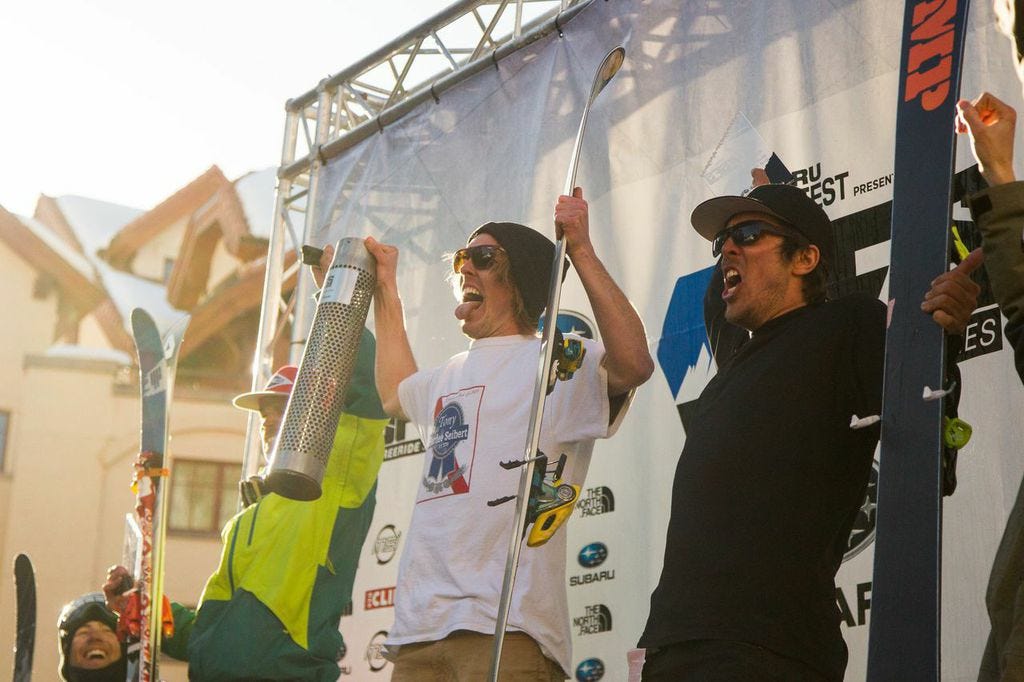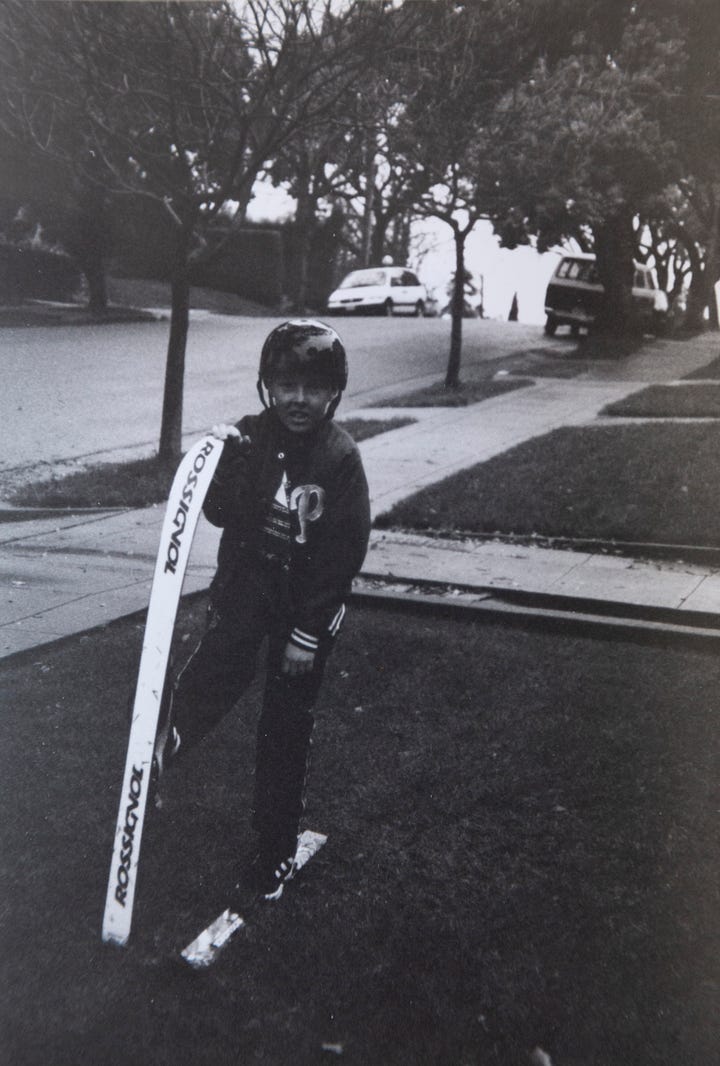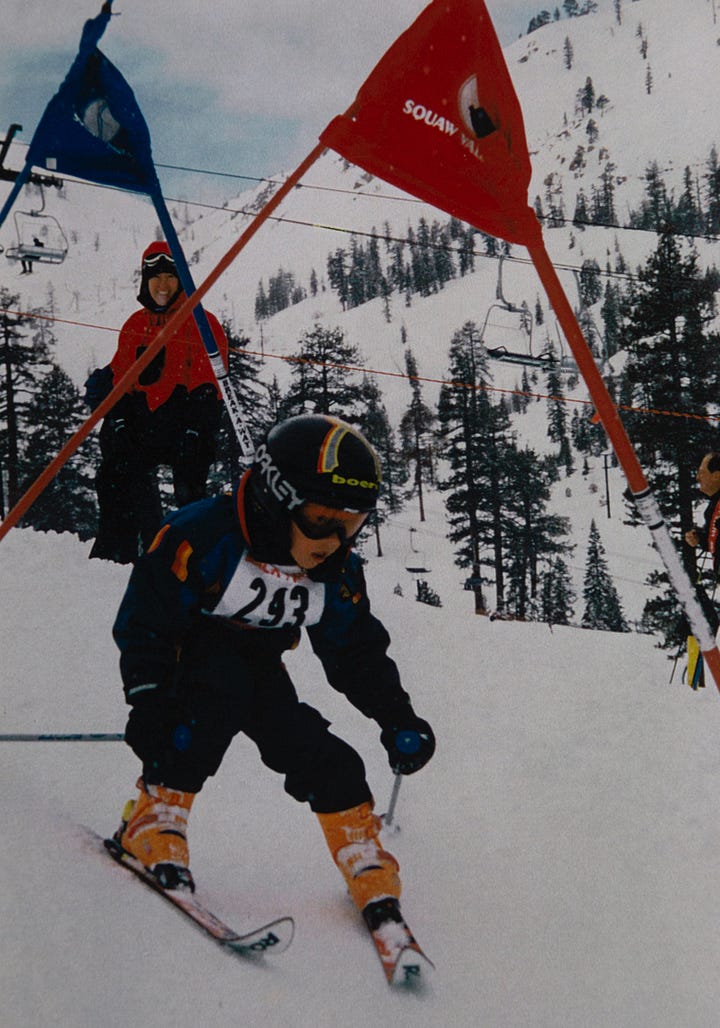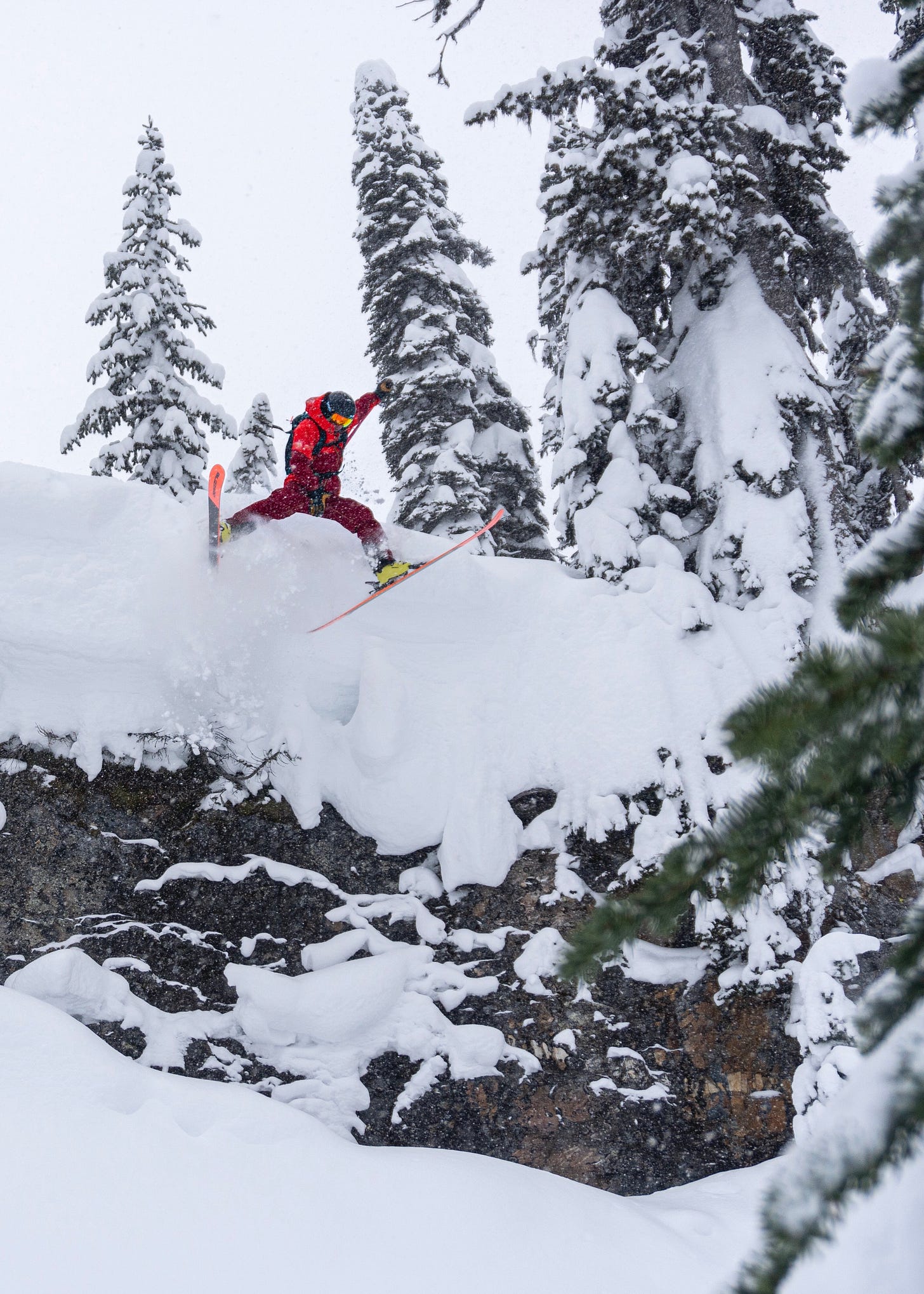This week’s interview is with professional big mountain skier, Connery Lundin. Connery grew up ski racing in the Squaw Valley. However, by the time he entered college at the University of Colorado-Boulder, he found himself burnt out on ski racing and quit competing until he entered his first big mountain competition. As fate would have it, he placed third and reignited his dream to become a professional skier - a dream he’s lived out ever since. Over the course of his career, Connery has won the 2015 Freeskiing World Tour, been featured in multiple ski films from Matchstick Productions and Warren Miller Entertainment, and coached countless kids in landing their first backflips on skis as a coach at Party Beach Ski Camps.
I figured there was a lot I could learn from Connery about fear, pushing the edge of your comfort zone, and carving out your own path. I was curious about questions like: How has he learned to confront fear that’s not purely mental and manage the very real risk of physical danger? How has he learned to differentiate between good and bad risks? What has his career taught him about learning to trust himself?
We spoke about all of that, as well as:
Charting a career path on his own terms
Learning to view fear as a good thing
Regaining trust in himself after a bad crash
Defining the right reasons to guide his career
Being okay with not knowing what’s next
Note: The following interview has been lightly edited for clarity and length. While every effort has been made to preserve the integrity of the conversation, please be aware that the quotes may not be verbatim but reflect the essence of the dialogue.
Let’s start with a few quick questions to set the scene:
Where do you live? I live in Lake Tahoe, California, specifically the Olympic Valley.
How do you describe your occupation? I describe my occupation as a professional skier. Then people always say, “Well, what does that mean? Do you get paid to ski?” The answer is “yes” but there are a million different subsets of skiing. There's free skiing, racing, ski-jumping, half-pipe. You can get as specific as you want. I think professional big mountain skier is probably the best way to describe me.

I enjoyed reading an interview about your path back into skiing after you quit ski racing. You said, “I stuck with school with a plan to pursue skiing after. I’m happy I did that, but it was a big risk. I did the whole thing backwards: I went to school, then tried to be a pro skier, and I’m skiing more and more park as I get older.” Can you talk more about your path and the mindset that gave you the conviction to pursue a path on your own terms?
I started this whole thing during 2007/2008 between high school and college. At that time, there were limited paths to becoming a professional skier. The path was to turn pro by age 17 or 18. If you weren't pro by a young age, sort of phenom style, the idea was that the ship had sailed because skiers were phased out and done by the time they were 30. I thought the dream was over, but after college the conviction part really came from seeing people I'd skied with or knew turning pro and doing it well. Maybe it was a little arrogant but I thought, “I could do that, too. If they're getting dropped off on that mountain peak in Alaska with a helicopter, why shouldn’t I be there? I could do that too.”
A lot of it came from that, and then just from the desire to make skiing a lifestyle. In college, I had success in a freeride competition, and that really opened a lot of doors quickly. Even before that happened, I remember seeing competition runs and just being like, “I've been skiing my whole life. I've trained really hard. I want to do that, and I can do that.” Maybe there was some false belief or naivete that helped.
One thing I encounter a lot in my coaching work is the idea that “I’m too old.” Often it’s a sentiment coming from people in their 20s, 30s, or 40s! You decided to not go pro at a young age and, instead, have been skiing more as you’ve gotten older. What would you say to someone who’s confronting the fear of feeling “too old” to do something?
I'm trying to frame it all back to making these decisions when I did because I think there is something to be said for being more malleable when you’re younger. You're more naive and willing to take more risks. When you're older, you start to put up these barricades and self-limitations. What I always go back to is actually pretty morbid. You're gonna die one day - just go for it! I only have this one opportunity. Who cares at the end of the day? Thinking that way takes the intensity away and the weight off of it by getting rid of fear-based thinking as much as you can.
I absolutely loved the instagram post and caption of yours from 2022 below.
These kinds of details don’t always come through in a short Instagram video. So did I just ski up to this cliff and send it like a boss? HELL NO! I was scared shitless, thinking I could get hurt on Friday the 13th like an idiot. I spent half an hour neurotically manicuring all 5 feet of in-run, which probably wasn’t even necessary. I engraved the perfect trajectory with my ski poles and did lots of visualization. These things are all part of my process that allows me to take risks in the safest way possible, something I hope to encourage and share more of in the future.
I was really interested in talking to you because a lot of the interviews I conduct concern dealing with fear that is real but unlikely to put someone in physical danger. In your case, the fear of physical danger is very real. Can you talk more about how you’ve learned to manage that fear and take risks in the safest way possible?
I think there's something to be said for the process of being afraid of something, whatever it is - jumping off a diving board as a kid or talking to a girl when you're in 1st grade. There’s something about doing something you’re afraid of and then being able to say, “Oh my God, I did that!” There’s that boosted confidence that feels good after the fact, and it’s super helpful to keep that knowledge in the front of your mind; knowing that it’s good to scare yourself because of the gratification that comes from that whole process on the other side.
I coach ski camps in the summer, and there are all these little kids that I’ve taught their first backflips. Pobably 30 or 40 kids have learned their first backflips on Mount Hood at our ski camp. One of the things that I’ve found to be most effective is basically telling these boys and girls that it's good to be scared because that fear prepares you and makes you concentrate harder. If you weren't scared, it would be a bad thing because you're either not trying hard enough, or you're not thinking at all. To embrace fear in that sense is to realize that you can harness it.
You can tell me if this resonates. There’s really interesting research on the difference between people who have a mindset of “stress is enhancing” versus a mindset of “stress is debilitating.” People who have an enhancing mindset tend to be more creative and attentive than those who see stress as debilitating.
Totally. I’ll also say this - you don't have to jump off cliffs to confront fear. I'm actually more afraid of writing corporate emails to sponsors than I am of jumping off cliffs. It would be false to say that I’m fearless. The everyday office person probably has no problem writing corporate emails, and yet I’m afraid of it. We all feel fear in different ways. I've just gotten really comfortable confronting dangerous situations with skis on my feet.


How do you decide what risks to take? And how do you decide when it’s not a moment to take a risk?
In a lot of ways with skiing, it's a little easier because you're able to break fear down into these small increments. Maybe you jump off a 2-foot cliff, and that's your biggest cliff to date. Then the next day you do a 3-foot cliff and you slowly step up. That’s the safest way to progress. You're working your way up and gaining confidence by pushing yourself when you’re scared. That said, if you go from jumping a 20-foot cliff to a 60-foot cliff, that’s a place where you should probably be really scared, and you probably shouldn't do it because you’re biting off too much. The more risks you take, whether big or small, the more you start to hone in on that ability to intuit whether or not something is a good or bad risk. I think the hardest thing about skiing is being able to distinguish that.
Has there ever been a moment where you took a bad risk and it was hard to get back on the mountain?
Definitely. I had a really bad crash in 2014 at a competition in Big Sky, Montana. It was basically the worst-case scenario. If I won the competition, I would have qualified for the Freeride World Tour. I was in 4th place after the 1st day so I had to lay down a really heavy finals. I bit off way more than I could chew, and I landed on rocks and totally wrecked myself. I was able to ski the next year, and it actually went really well, but I lost trust in my own judgment. My ability to see risk got clouded by the tour, the sponsors, and all the stuff. It was a scary place to get to.
What helped you get that trust back?
Stepping away from the whole structure, archetypes, and externalities that drive professional skiing. I ski because I love to ski, but I do have sponsors and get paid to ski. There's a little ego boost when you post and stuff like that. I really tried to pull away from all of that as much as I could so that I could make decisions for myself without the influence of other things, or at least be able to identify that those other things were there. It felt like everything got jumbled at that competition.
Has that changed how you view the business side of your career?
Definitely. I think a lot of professional athletes might feel the same way in sports like skiing, snowboarding, or surfing where you’re constantly asking yourself if they are art or sport. It’s kind of both. If you’re a baseball or basketball player, your job is to score, and it’s pretty straightforward. With something like skiing or surfing, it becomes a balance of, “Well, if I post a lot I'll get more sponsors and more money.” But that’s not really what I want to do or who I am. I’d lose my street cred. You constantly have to play with the balance between those things. I think it’s important to be doing it for the right reasons. I think that’s what will keep you doing it for the longest amount of time.
What have those reasons turned out to be for you?
They change every year but fundamentally it’s about promoting having fun on skis. I have three things: don’t die, have fun, and do it with style. And then be a good ambassador of the sport for younger kids to look up to so that they don't have to fling themselves into rock walls like I did.
Many people I interview for the No Directions blog have created lives that are uniquely theirs in terms of how they live, work, and build their lives. What does the life that is uniquely yours look like today?
I’m still very much about the skiing. If I’m going to be a professional skier, I think it’s very important for me to be proud of the skiing I’m doing and the brand I’m representing and putting out there. Doing that well is my main thing. I know I could make a lot more money if I hustled sponsorships and all that, but that's not really what I want. I want freedom, which I have a lot of. The main sponsors and what I have going on right now is perfect. I appreciate having the freedom to float around and not wake up and feel like I have to be on the computer all the time.
I almost feel like I’m in a retirement phase and really enjoying this bit of my career. Retirement probably isn’t the right word. It’s more about enjoying the process now because for the first 5 years of living this dream I was so stressed out by it. It sort of felt like, “This is it? Fuck.”
It sounds like this might still be an open question, but what’s next for you?
I went to the University of Colorado Boulder Business School. When I graduated from college, I had one of these professors who I was close with ask me: “So, what are you going to do?” I told him, “Probably ski and try to be a professional skier.” Of course, his next question was, “But what are you going to do for real?” If it didn’t work out, I told him I’d probably still do something in skiing, but I was willing to give it my all and see what happens.
I'm someone who is definitely more comfortable going with the flow and letting things happen. I’m not trying to hyper-focus on the next thing while this good thing is still happening. That being said, there is a next chapter. I don’t know what that will look like really. I’ve got passions like creating content and editing, not for myself, but for brands. I also like designing ski products. Who knows? I think doors are open as life goes on.




